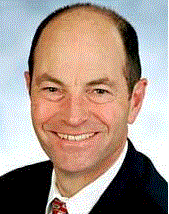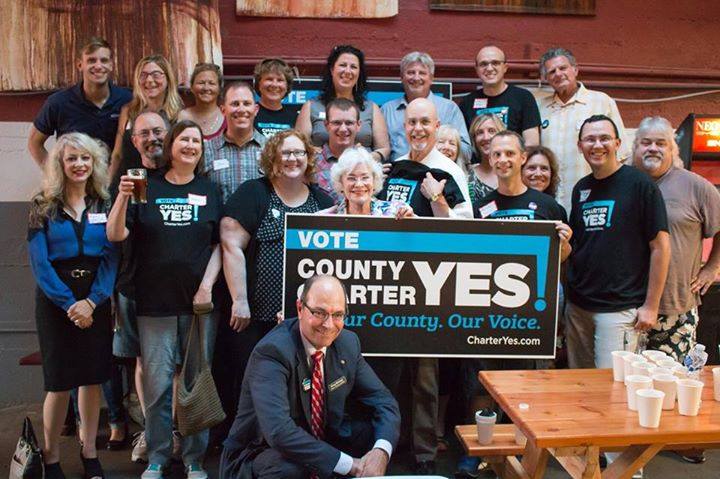
We elect our government officials to represent us in vital functions of government, with the intention to promote the common good. Nearly all politicians can endeavor to deliver on this worthy goal, or they can slide back to various levels of operating from self-interest, which of course is the culture.
On a local level there are operational and bureaucratic positions which provide the officeholder with an immense amount of governmental power – and the potential for an immense amount of mischief. It is reasonable these offices be subject to approval and review by the electorate. Among these are the county offices of the Sheriff, Treasurer, Prosecuting Attorney, Assessor, Clerk and Auditor. All these offices perform functions that directly affect county residents, and all of them are vulnerable to abuses that favor one group of residents or a political ideology over another.
These are generally partisan offices, and as such, we can expect certain behaviors from the officeholders based on their partisan ideology. This is expected. What we should not tolerate, partisanship aside, is when these offices are used subjectively to subvert the interests of the people, to carry out personal agendas or even vendettas, or to control public perceptions by controlling access to facts and information.

With this in mind, let’s take a close look at our current County Auditor, Greg Kimsey (R). Kimsey was elected to office in 1998, and has easily maintained his seat, without even a challenge in 2006 and 2010. Thanks to the length of his tenure, Kimsey has seen the rapid growth of the ‘big government’ culture in Clark County, and has been a key player in this unfortunate, but typical trend. When David Madore was elected in 2012, he began a movement to lower barriers to commerce and job creation, reduce government waste, and cut back low-value programs. Madore took a Reaganesque approach to government funding, believing a vibrant economy would ultimately create more county revenue than just raising taxes. This style of governance is always viewed with alarm by those who don’t understand it or whose rice bowl would be compromised. Kimsey seems to be one of those. Partly because of this, Kimsey developed Madore Derangement Syndrome—an apt name for the behavior of those who emotionally react to Madore’s efforts to deconstruct the power of a small group of people in this county. A typical small group whose self-interest is more important than that of the citizens.
In years past Kimsey seemed the model of an earnest auditor with the apparent awareness that a public official who orchestrates elections should project no impressions of favoritism or an agenda. But when the local political establishment’s power was challenged in the last few years, Kimsey demonstrated his true nature.
In 2014, liberals and establishment Republicans promoted the idea of a home rule charter that could fundamentally redefine how the county was governed. The charter essentially became the anti-David Madore Act of 2014. Accounts from some freeholders tell us that the powers invested in various offices defined by the charter were subjected to the “Madore test,” i.e. the question was asked, “Yeah, but what if Madore gets into that position?”
Kimsey was active on multiple levels on influencing the charter the freeholders produced. The ethics of the County Auditor having any influence in this process were problematic in the first place, as someone with his sort of inside knowledge of how the bureaucracy works could write himself and his friends quite a secure position. Some speculated that Kimsey hoped to land the lucrative County Manager position, which would have given him serious power in the county government without being answerable to the voters.
In the 2014 general election, the Freeholder’s charter was on the ballot. The Clark County voter’s pamphlet had the required statements for an against (pp 72-73), but Kimsey didn’t feel that was enough, and included a two-page “charter summary” (pp 58-59). Kimsey claimed in his auditor’s letter that this was a cost-saving measure that would allow voters to make a more informed decision. The question is, informed by who, exactly? There was no attribution about who wrote the two-page summary, and what their bias was, if any. The minority of freeholders who objected to the charter weren’t given a chance to rebut this summary. The summary had no check on it to ensure objectivity. It was a blatant abuse of the Auditor’s power and position to promote a ballot measure in which the Auditor, as a freeholder, had a vested interest. The Auditor’s office had no legal requirement to provide any sort of informational brochure about the charter. Any funds to promote such an information brochure should properly have been provided by charter proponents. Essentially, the voter’s pamphlet illegally provided three pages of argument in favor of the charter, and only one against. The only objective thing the Auditor could have done would have been to provide the text of the charter in its entirety, without editorial comment.
Kimsey also objected to publishing the Minority Report on the County Charter Main web page (so it would have equal exposure with the majority report) and sought to remove the Minority Report entirely from the county records and purge it from the minutes.

Kimsey collaborated with hyper-partisan Democrat Steve Stuart and founded the pro-charter advocacy group Team ClarkForward, and weighed in on social media, making disingenuous claims to promote the charter.
Kimsey continued to demonstrate his partisan interest in the charter in other capacities. Most local Republicans were unaware that Kimsey was an elected Precinct Committee Officer for the Clark County Republican party, since he rarely attended any central committee meetings. He did show up to a central committee meeting by surprise when the issue of whether or not to endorse the charter was brought to the floor. Kimsey argued in favor of the motion during discussion. The motion to endorse was voted down, and Kimsey left the meeting early, before other business was concluded. He was never seen since at any party meetings. All of this inappropriate action by Kimsey lead to a formal complaint by the local Republican Party–however a politically influenced Public Disclosure Commission (PDC) chose to look the other way.
The question every voter needs to be asking is whether it’s ethical for the County Auditor to be placing his thumb on the scale of public opinion like this, particularly on an issue in which he obviously has such a vested interest? Joseph Stalin said, “The people who cast the votes don’t decide an election, the people who count the votes do.” Washington State has a recent history of election irregularities – unsecured ballots, misleading absentee ballot reconciliation reports, provisional ballots improperly tabulated without verification of voter eligibility, felons voting, elections results being certified even when there are more votes cast than there are voters, and even “enhanced” ballots (election workers deciding for voters how they meant to vote based on patterns elsewhere on the ballot, even if the voter deliberately did not select a candidate). The 2004 Washington governor race clearly demonstrated the depths of the voter fraud problem in Washington State. The potential for mischief is far too great to be entrusted to someone whose objectivity is compromised. We elect these people with an eye to their ability to objectively execute the duties of their office without allowing personal interests to affect their performance—especially the auditor overseeing elections. It’s incumbent on the officeholder to maintain a demeanor that avoids even the slightest suggestion that subjective preferences influence their performance. Kimsey’s vocal political endorsements and harsh criticisms of those he opposes are sufficient to raise concern over the integrity of the county election system.
In 2015, Kimsey audited the fee waiver program, one of the programs the conservative County Commission promoted to help revitalize the County economy. Kimsey’s audit results were harshly critical of the effectiveness of the program. Anyone who has ever worked as or with an auditor knows that a forensic audit can be biased if the auditor has an axe to grind. The Commissioners requested that Kimsey convene an Audit Oversight Committee to review the results of his audit. Kimsey recruited Tiffany Couch of Acuity Forensics, apparently with the belief that she would approve whatever audit results he had developed. Couch was thorough, and brought Kimsey’s results into question, citing numerous cases where he failed to substantiate his claims with objective evidence. The subsequent acrimony led to Couch’s resignation.
Kimsey feels his position is secure, and becomes ever more bold in his overt partisanship. He has invested himself with the establishment Republicans and RINOS as evidenced by his recent public comments at the campaign kickoff fundraiser for John Blom, attended by politician like Julie Olson and Paul Harris who have a demonstrable history of placing party and power over principle, and working against the movement towards smaller, more ethical government. At this event he stated that RINO Julie Olson is his favorite councilor and asked the group, “How do we rid ourselves of David Madore?” Kimsey seems to agree with the liberal stance of the Columbian newspaper, as he bemoaned that the voters who only vote in presidential races, “don’t pick up the Columbian and see what’s going on.” In other comments he quoted a byline of Columbian government reporter Katie Gillespie’s anti-Madore stance.
Can we trust our elections process with such obvious partisanship by our County Auditor? This is the gatekeeper for items to be published in the voters’ guide, who is ultimately responsible for certifying the election results, and administering the entire elections process. Given his history and current stance we can be reasonably concerned that he’ll use the power of his position to influence the outcome of this year’s elections, to return power to the big government establishment centrists. Kimsey requires careful oversight, and must be called out when any irregularity is noticed, before his mischief can have further illegitimate effect.
